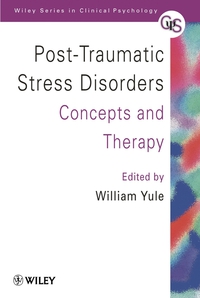How can we best understand PTSD? Why do the majority of people who are exposed to traumatic stress fail to develop PTSD? Is PTSD best regarded as a failure or delay in the natural processes of protection and recovery? This book represents the fruits of ten years? experience of working with the survivors of accidents and disasters. The contributors have all worked at the world–famous University of London Institute of Psychiatry?s unit for the study and treatment of PTSD, and thus combine here to present a coherent account of PTSD and its treatment, based largely on a social learning and cognitive behavioural framework. Perspectives from cognitive psychology and information processing, social psychology, developmental psychology, and neuropsychology are brought together to enlighten our understanding of PTSD, individual reactions, and treatment approaches. Cross–cultural issues and issues of disaster planning and emergency response are also covered. Academics, researchers and professionals will find in this volume
? Contemporary models of PTSD based on the latest knowledge
? An authoritative, critical account of PTSD and treatment methods, based on scientific research and unparalleled clinical experience
? A coherent approach to PTSD in adults and children, with consideration of both individual aspects and social/community concerns
All psychologists, psychiatrists, therapists and planners with a special interest in or responsibility for dealing with PTSD will welcome this important and much–awaited volume. From the Foreword by Professor S. Rachman, Vancouver: "an extremely informative and stimulating book that covers the field. How much progress has been accomplished in the past decade? The best and quickest answer is to read this volume." Это и многое другое вы найдете в книге Post–Traumatic Stress Disorders (William Yule)
